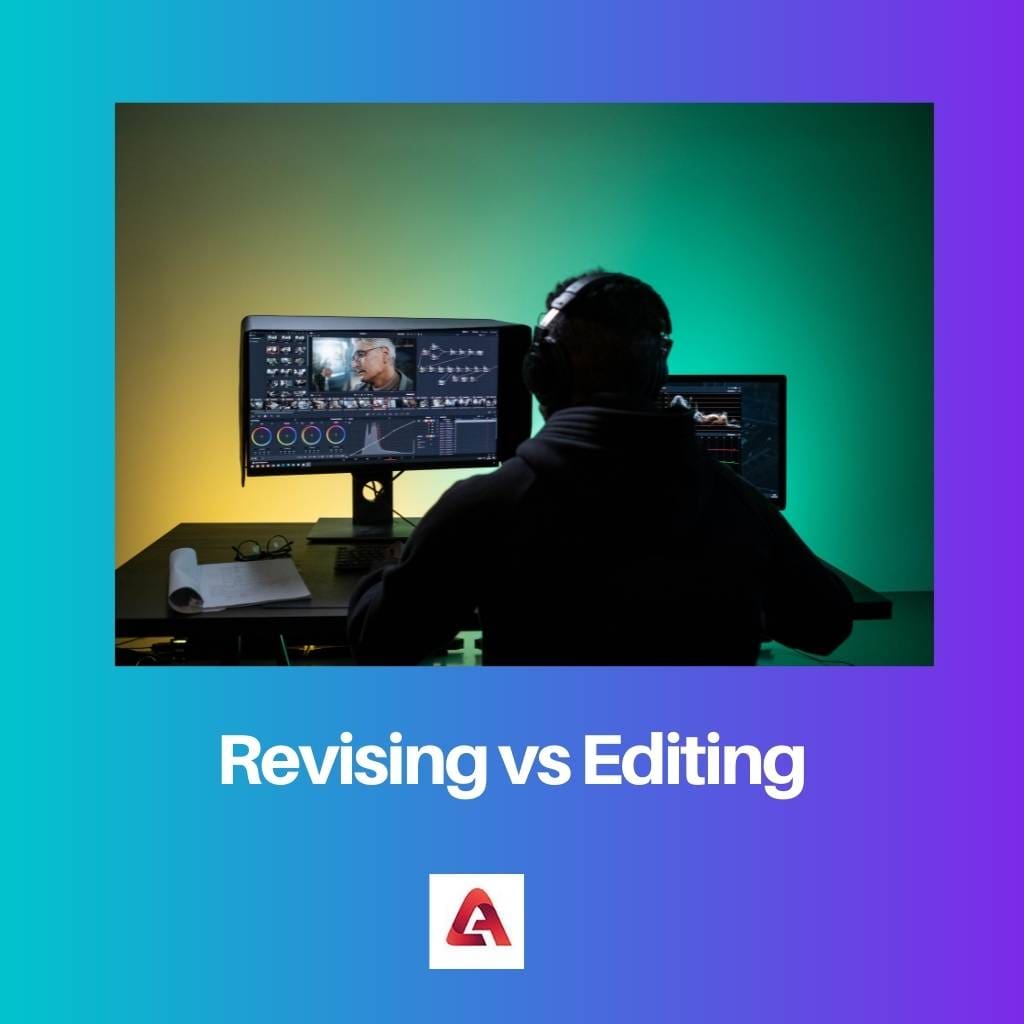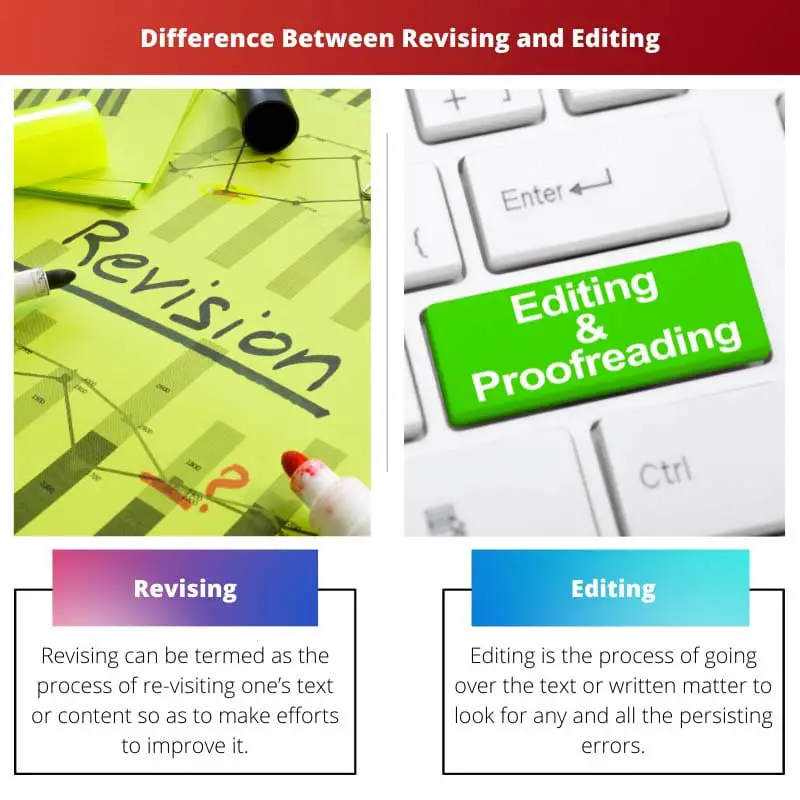Any piece of written literature needs a final and finishing touch to make sure that it is error-free. This is an extremely crucial process that no writer dares to skip.
Every novel, article, or passage needs at least one revising and editorial glance. The two words, Revising and editing, even though used interchangeably, stand for different things.
Key Takeaways
- Revising involves making substantial changes to a written work’s content, organization, or structure.
- Editing involves minor changes to improve grammar, spelling, punctuation, or formatting.
- Revising and editing are important steps in the writing process and should be done carefully to ensure the final product is clear, concise, and effective.
Revising vs Editing
The difference between Revising and Editing is that the former means altering the text by making additions, subtractions to the content. It means to alter the document if required. On the other hand, editing is the process of going through the text to look for any grammatical mistakes or literal inaccuracies, etc.

Revising is the process of improving one’s written content by making suitable changes in the text. These changes could include the addition and subtraction of matter or even the introduction of new ideas.
It could also mean rephrasing, realigning, or readjusting the entire matter or written material.
Editing, on the other hand, is the process of going over the text to make sure that there are no errors present.
It is a cursory glance that is taken to check for spelling errors, usage of punctuation marks, grammatical mistakes, incoherent speech, and so on and so forth.
Comparison Table
| Parameters of Comparison | Revising | Editing |
|---|---|---|
| Meaning | It means to change the text by additions or subtractions to make it better. | It means checking and correcting any errors that may be present in the text. |
| Alterations | The text is altered by adding, removing, moving, or changing certain phrases or paragraphs. | The text is altered by correcting grammar, punctuation, syntax, etc. |
| Address | It addresses higher-order concerns like the development of the text, etc. | It addresses lower-level concerns like the choice of words, spelling mistakes, etc. |
| Focus | Its focus is on ensuring that the text meets the requirement of the audience or the reader. | It focuses on every sentence and word. |
| Stage | Revising is done after one has completed the first draft of the paper or text. | Editing is done after the revising stage is over. |
What is Revising?
Revising can be termed as the process of re-visiting one’s text or content so as to make efforts to improve it.
Revising a document can include including fresh ideas, reassessing the written matter, making amendments to it by adding or deleting phrases or sentences, and so on and so forth.
It is aimed at giving the written matter a finishing touch by enhancing the content.
While revising a document, the writer ensures that the gist of the message being portrayed in the text matches the requirement and expectations of the audience. It should be in congruence with the topic.
The focus of revising relates to higher-level concerns such as developing the text, ensuring it matches the criteria of the organization or audience concerned, etc.
This is why in revising a document or any matter, the entire paragraphs can be modified, realigned, or readjusted. This is done to meet the requirement of the target audience.
Generally, it is the author’s job to revise his or her work before sending it for or proceeding towards editing. This means that the text or matter should be worked out in an orderly fashion and must be in good shape in terms of its content.
Once the revising part is complete, the text can then be edited and given a conclusive shape.

What is Editing?
Editing is the process of going over the text or written matter to look for any and all persisting errors.
The purpose of editing is to check the grammar of the content, correct the mistakes present, fix the syntax, ensure correct usage of punctuations and other such related stuff.
It is focused on ensuring that no error remains in the content. Editing makes up for the concluding stage of writing any piece of literature.
There are no changes required after the content has been edited thoroughly. It can then be uploaded or published without further delay.
The focus of editing relates to lower-level concerns. In a general sense, it means to eradicate all spelling mistakes, assess the choice of words, and make sure that the text has clarity and is easy to comprehend.
It is in editing that the content must be checked to ensure that it has been written in a way that suits the audience and the readers.
Usually, editing is done by the editor, but there doesn’t need to be a separate editor for every author. In certain cases, the authors themselves have to edit their work.
Editing is the last step, and hence it is succeeded by the revising stage. In editing, each and every word or sentence has to be proofread for errors, etc.

Main Differences Between Revising and Editing
- Revising is the process of altering the text by adding or deleting the text, whereas Editing means eliminating the errors present in the text.
- Revising includes realigning, reassessing, and readjusting entire paragraphs or phrases, whereas editing includes correcting mistakes related to incorrect spelling, grammar, syntax, etc.
- Revising is undertaken by the author himself or herself, whereas editing is done by an editor.
- Revising focuses on higher-level concerns such as developing the text, introducing new ideas, etc. On the other hand, editing suffices itself with lower-level concerns such as clarity in the text, choice of words, etc.
- Revising is done after the author has finished with at least the first draft of his or her text, while editing is undertaken only after revising has been completed.


The comparison table provided here is very helpful in understanding the distinctions between revising and editing. It’s essential to recognize the specific focus and alterations involved in each process.
The emphasis on the importance of revising and editing is well-explained in this article. Writers should take note of the specific alterations and focuses involved in each process.
Thank you for this explanation of the key differences between revising and editing. It is crucial to have a clear understanding of both processes to ensure the final quality of any written work.
The explanations of revising and editing provided in this article are clear and comprehensive. It’s important for writers to recognize when to revise and when to move on to the editing stage.
The detailed description of what revising and editing entail is insightful. Revising focuses on the development of the content, while editing addresses the technical aspects to ensure precision.
The comparison between revising and editing is elucidated effectively in this article. It’s evident that both processes play distinct yet complementary roles in refining written content.
Understanding the difference between revising and editing is essential for any writer. This article offers a thorough breakdown of the two processes.
The distinction between revising and editing is well articulated in this article. Recognizing the focus and objectives of each process is critical for refining written work.
The detailed descriptions of revising and editing provide writers with a clear understanding of how to approach refining their written work. This article offers valuable guidance in this regard.
The article provides valuable insights into the nuances of revising and editing. Writers can benefit greatly from understanding when and how to engage in each of these processes.